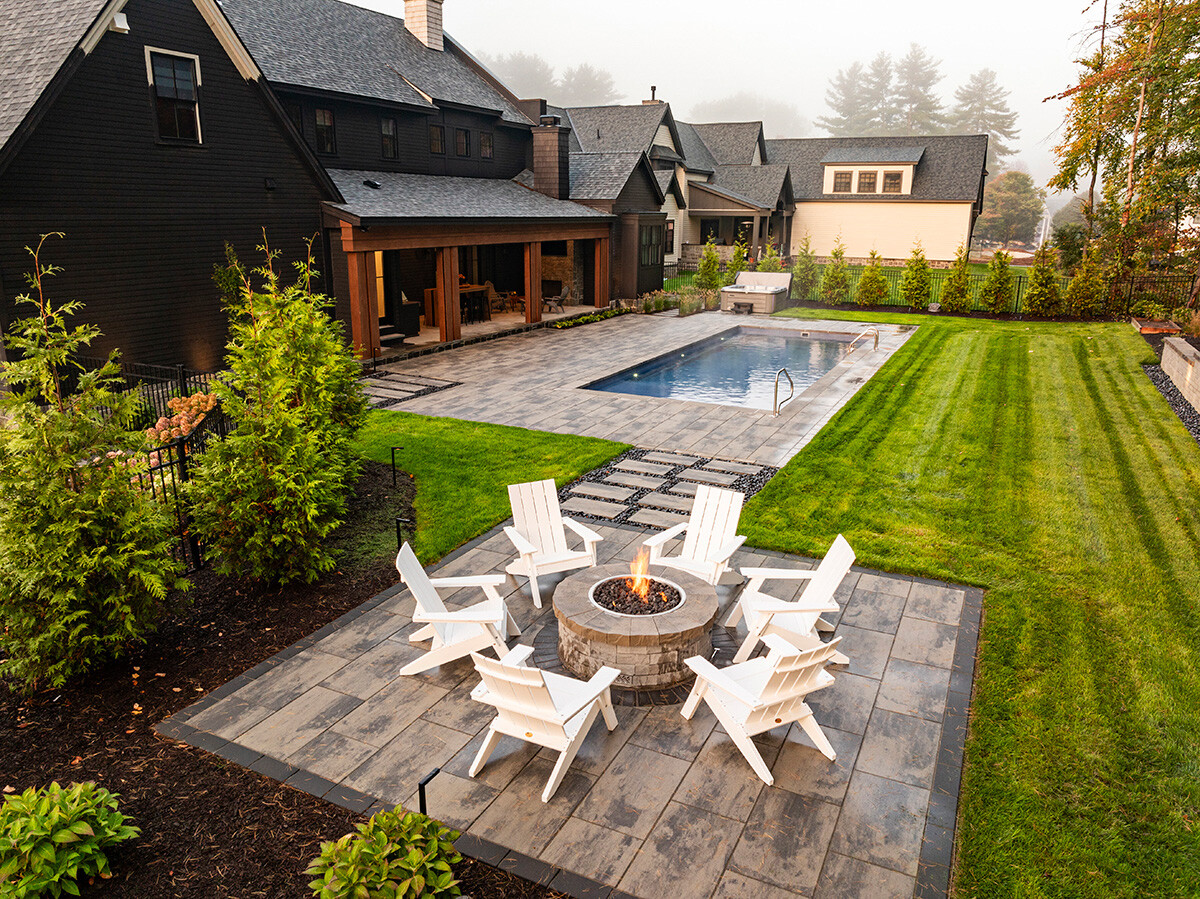
Written by: Carl Trinkle
9 min read
Nothing transforms a property quite like stunning landscape design. Even the grandest, most beautiful home can fall short of its potential without the perfect landscape to highlight and complement it.
From the idyllic outdoor space that blends comfort, functionality, and aesthetics to unforgettable curb appeal that sets the tone for the entire property, proper landscape design elevates a landscape to its full potential.
Such comprehensive and effective landscapes don’t occur by accident, either. They are intentional, strategic, and thoughtful. They are the culmination of a vision, collaboration, and a dream realized. In other words, they require the creative, passionate touch of a residential landscape contractor that offers full service landscape design and construction services.
In this article, we'll guide you on your journey to hire a landscape designer in the Capital Region of New York by looking at:
The Difference Between a Landscape Designer and Landscape Architect
Hiring Tip #1 - Confirm Reputation & Experience
Hiring Tip #2 - Vet for Creativity & Capability
Hiring Tip #3 - Ensure Clear Communications
Hiring Tip #4 - Seek out Local Knowledge
Hiring Tip #5 - In-House Design and Construction
Choosing a Landscape Designer with Confidence
Professional Landscape Design: Your Guide to Finding the Right Landscape Designer
Before diving into the criteria you should consider when hiring a landscape designer in Troy, NY, and the surrounding area, it’s important to understand exactly what a landscape designer does. Two of the primary questions that come to mind when homeowners begin the process of finding a landscape designer are: “What does a landscape designer do?” and “What is the difference between a landscape designer vs landscape architect?”
Landscape Designer vs Landscape Architect: What’s the Difference?
While these titles are sometimes used interchangeably, there are some key distinctions between the two. Landscape architects have educational requirements – at minimum, a bachelor’s degree, hours requirements, and state licensure – and they tend to work on larger, more complex commercial projects that involve large-scale construction.
Landscape designers, on the other hand, often have credentials that overlap, but they do not share the same state licensing requirements. As such, they are more often found working on residential landscaping projects, including high-end properties where detail and professionalism are essential to meet the needs of their clients.
What to Look for When Hiring a Landscape Designer
When entrusting your property to a residential landscape contractor, it is extremely important to choose wisely. The right professional landscape designer can take your landscape to new heights - while the wrong choice can leave you disappointed and wishing for more.
To take the guesswork out of your decision, use the following tips to narrow down your search. With the right research and a bit of effort and patience, you can set yourself (and your landscape) up for success.
Tip #1: Determine a Proven Track Record, Reputation, and Portfolio
You can learn a lot about a company by examining its reputation. While it is not the end-all-be-all, taking a look at online reviews, speaking to former clients, and looking at a portfolio that highlights their previous work can tell you a lot about a landscape designer’s professionalism, reliability, communication style, and handiwork.
Online Reviews
One of the easiest places to start is online. Check out various review platforms to get a well-rounded perspective on a company’s general reputation. Do they have primarily good reviews? What are the most common complaints former clients have? Do they conduct themselves in a professional manner if they respond to reviews publicly?
Direct Client Feedback
If you can, find a way to speak to former clients of the landscape design company as well. They can provide first-hand knowledge of what it was like to work with the company, their level of satisfaction with the completed project, and other anecdotes that come from direct experience. A good landscape designer should have no problem getting you in touch with past clients. This information is truly invaluable, as it gives you insight into what working with a particular landscape designer might be like.
Portfolio of Work
Finally, don’t underestimate the power of a portfolio. If a professional landscape design company does not have a portfolio, that is a big red flag. They should be able to provide you with examples of their work, discuss the details of the project with you, and confidently stand behind their accomplishments. This also gives you an opportunity to determine if their landscape design style fits your aesthetic preferences.
Tip #2: Vet for Creativity and Capability
The ability to visualize what a property could be is a hallmark of a skilled landscape designer. Creativity allows them to look beyond what is currently there and is one of the most important characteristics that any exceptional landscape designer will demonstrate. It is what takes a dream and turns it into an achievable vision, complete with a plan to bring it to life.
However, creativity is only half of the battle. Without the capability to execute a creative vision, even the most stunning concepts will fall flat. In other words, creativity requires a practical approach if it is to be effective. Professional landscape design isn’t just about dreaming big; it’s about having the technical knowledge to pull it off.
For example, a particular property might need specific features to thrive. Less-than-glamorous elements like drainage and retaining walls are integral to the design process, even if they aren’t creative or exciting. A good design team will understand the pragmatic side of things and balance creativity with functionality - all while providing a construction crew with the appropriate documentation to build it.
Finding a landscape designer who has both the creativity to envision a gorgeous property and the capability to execute it correctly is a must. It’s a rare blend of talent and technical expertise, but it is worth searching for if you want your property to flourish.
Tip #3: Ensure Clear and Effective Communication
Entering into a professional relationship with a landscape designer is a big deal. Not only is it a significant financial investment to transform your property, but it is also a leap of faith. You are entrusting them with your home, resources, and future.
If there’s one thing every relationship needs to thrive, it is communication, and this holds true for your relationship with your residential landscape contractor. Whether you want to be hands-on and collaborate throughout the process or you prefer to sit back and let the experts take the lead, clear and effective communication is a must.
You should be able to discern a landscape designer’s communication skills and style during the hiring process by simply talking to them, sitting down for consultations, and so on. Look for them to be open, honest, straightforward, and transparent. You should also consider how well your communication styles and preferences mesh. If you reach out and don’t hear back from them within a couple of business days, they probably aren’t going to be great ongoing communicators.
Not all forms of good communication are the same. Don’t talk yourself into a professional relationship with a company you don’t connect with just because they are technically communicating well. You need to get along in a personal manner to a certain degree to have your project reach its full potential.
Keep in mind that communication extends beyond simple verbal or written correspondence. The tools a company uses can also have a direct impact on communication. For example, 3D design previews are a form of communication that can provide invaluable insight into the details of your project before you fully commit to a concept.
Tip #4: Seek Out Knowledge of Everything Local (Materials, Plants, Climate, etc.)
When it comes to landscape design in the Capital Region and cities such as Saratoga Springs, Albany, and Clifton Park, the company you work with needs to be more than just a landscaping expert; they need to be a local expert.
Geographic location makes a tremendous difference in landscaping. It affects everything from plant selection and natural materials to climate considerations and irrigation needs. If a professional landscape design team does not have local, regional experience, they are most likely not setting your property up for sustainable long-term success.
Look for a landscape design team in the Capital Region that has real knowledge of the area. A history of working in the region is a good indicator of their knowledge, and you should feel free to ask them questions specific to their experience landscaping in Saratoga Springs, Albany, Clifton Park, and other nearby cities.
Local landscaping knowledge and the use of suitable plants and materials contributes to a sustainable landscaping design and saves you money. Native plants tend to be hardier and require less maintenance, knowledge of the climate can reduce water waste, and working with the local environmental factors rather than against them allows your landscape to shine and last without fighting against nature.
Tip #5: Look For Experienced In-House Designers
If you want to make the most of your landscape design in the Capital Region, you should work with a company that has in-house designers. It may come as a surprise, but not all landscaping companies have their own dedicated designers in-house, leaving them to either outsource their design work or rely on other employees who may not have the same education and experience.
The benefits of working with in-house landscape designers cannot be understated. They have the education, experience, and expertise to guide you through the process, work with the unique traits and nuances of your property, and bring your vision to life. They also have the professionalism required to work with you, communicate clearly, bring you into the design process, and ensure that the collaborative nature of the project facilitates the best possible experience and beautiful outcomes.
Having a team of in-house designers demonstrates that a landscaping company understands the importance of professional landscape design and makes it a priority. It’s a good sign that they care for the client experience and are committed to doing things right, down to the tiniest detail.
Choosing a Capital Region Landscape Designer with Confidence
Armed with the knowledge of what to look for in a residential landscape contractor, you can begin your search with confidence. When it comes to landscape design in the Capital Region, Gallivan has established itself as the premier option in the area.
With a reputation that stretches across decades, a robust portfolio demonstrating a spectrum of projects, and a team of four in-house designers, Gallivan’s commitment to its craft is as obvious as it is proven.
We encourage you to reach out to us to discuss your landscaping project. Our in-house designers and talented team of landscaping professionals are ready to help you bring your dream Capital Region landscape to life, no matter what your vision includes. Request your consultation today and let's get started.






